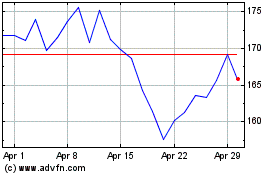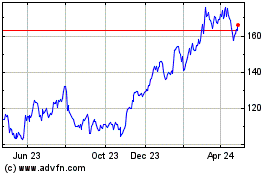Qualcomm Wins Antitrust Respite -- WSJ
August 24 2019 - 3:02AM
Dow Jones News
By Brent Kendall and Asa Fitch
This article is being republished as part of our daily
reproduction of WSJ.com articles that also appeared in the U.S.
print edition of The Wall Street Journal (August 24, 2019).
A federal appeals court froze a ruling that Qualcomm Inc. had
committed an array of antitrust violations, a boost for the chip
maker that allows it to maintain its business practices for the
time being.
The court decision Friday is a setback for the Federal Trade
Commission, which had sued the company alleging it engaged in an
illegal monopoly that harmed smartphone manufacturers and rival
chip producers.
The San Francisco-based Ninth U.S. Circuit Court of Appeals
granted a request by Qualcomm to stay the order by U.S. District
Judge Lucy Koh that the company change the way it licenses its
cellular technology.
Judge Koh's ruling, issued in May, found the company leveraged
its dominance in smartphone chips to force device manufacturers to
pay unreasonably high royalty rates for Qualcomm's intellectual
property.
Qualcomm argued its business practices were justified and
perfectly lawful and said a stay was necessary because Judge Koh's
ruling would irreparably harm the company while it was appealing
the case.
Shares of Qualcomm were down 4% at $74.04 in afternoon trading
on the Nasdaq Stock Market.
Friday's court action isn't a definitive reading of the merits
of Qualcomm's appeal, but it indicated the company has a fair shot
at winning.
The appeals court's seven-page order said Qualcomm "has shown,
at minimum, the presence of serious questions" about whether Judge
Koh's ruling against the chip maker was correct.
Qualcomm said it welcomed the ruling and believed the case would
ultimately go its way. The Ninth Circuit's stay "will allow
Qualcomm to continue to invest in inventing the fundamental
technologies at the heart of mobile communications at this critical
time of transition to 5G, " said Don Rosenberg, executive vice
president and general counsel for the company.
Qualcomm.shares spiked after the court's action then fell along
with the much of the tech industry when U.S.-China trade tensions
flared, with President Trump blasting Beijing's imposition of
tariffs on $75 billion worth of U.S. products.
Qualcomm supplies China's biggest smartphone makers. Last month,
the chip maker cut its full-year forecast for smartphone sales and
warned that challenges emanating from China are hurting its
business.
Bruce Hoffman, director of the FTC's bureau of competition,
expressed disappointment in Friday's court ruling, but, he said,
"We respect the decision and look forward to defending the district
court's decision on the merits." He said some conditions imposed on
Qualcomm remain in effect, including monitoring provisions and a
requirement that the company not interfere with customers who might
want to talk to the government about antitrust matters.
The stay means Qualcomm won't have to change its practices while
the litigation runs its course, which could take at least another
year. The appeals court said it will hear oral arguments in
January.
The case dates back to the start of 2017, when antitrust
officials at the FTC sued Qualcomm in the waning days of the Obama
administration. The case has produced an unusual split between two
federal antitrust agencies, with the Justice Department under the
Trump administration stepping into the case to support
Qualcomm.
The FTC had argued that staying Judge Koh's ruling would allow
Qualcomm to perpetuate anticompetitive actions that have spurred
higher prices and created roadblocks to innovation. The Justice
Department, on the other hand, said the judge's ruling could deal a
blow to Qualcomm's position as a leader in 5G wireless technology,
potentially to the detriment of national security.
The appeals court said the rift within the government was
another reason it delayed court-ordered changes to Qualcomm's
business. "This case is unique, as the government itself is divided
about the propriety of the judgment and its impact on the public
interest," the court said.
As Qualcomm faced FTC scrutiny, Apple Inc. in 2017 sued the chip
maker on similar grounds, alleging it charged above-market rates
for licenses to its patents. The Apple-Qualcomm legal battle grew
to encompass cases in China, Germany and other far-flung locales
before the companies reached a global settlement in April.
That deal dissipated the uncertainty hanging over Qualcomm, but
the FTC case could still shake the company to its core.
Judge Koh's ruling required the company to renegotiate its
licensing deals with phone makers and allow chip-making rivals to
use its intellectual property at reasonable rates.
Playing by those rules would cut into a licensing business that
currently accounts for almost two-thirds of Qualcomm's earnings
before taxes as of its fiscal third quarter. In court testimony,
Qualcomm executives have warned that some licensees were already
threatening to hold back payments as the court battle dragged
on.
--Tripp Mickle contributed to this article.
Write to Brent Kendall at brent.kendall@wsj.com and Asa Fitch at
asa.fitch@wsj.com
(END) Dow Jones Newswires
August 24, 2019 02:47 ET (06:47 GMT)
Copyright (c) 2019 Dow Jones & Company, Inc.
QUALCOMM (NASDAQ:QCOM)
Historical Stock Chart
From Mar 2024 to Apr 2024

QUALCOMM (NASDAQ:QCOM)
Historical Stock Chart
From Apr 2023 to Apr 2024
